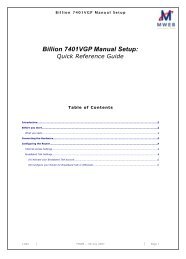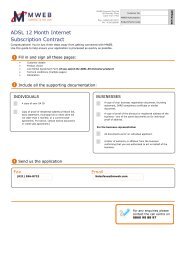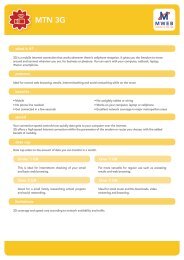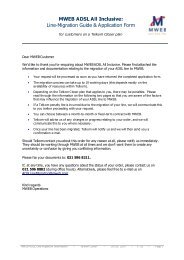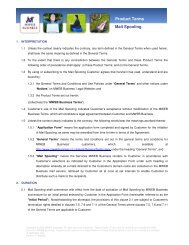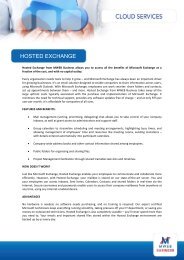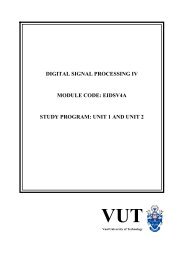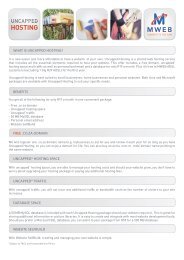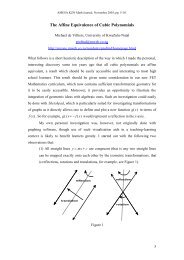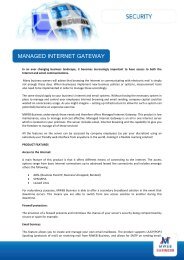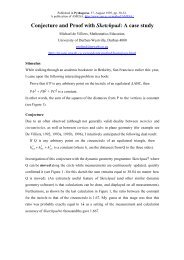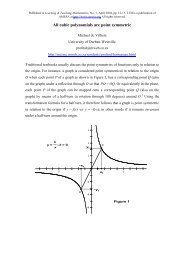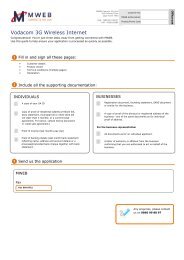MANUAL FOR IZIKO MUSEUMS OF CAPE TOWN - Mweb
MANUAL FOR IZIKO MUSEUMS OF CAPE TOWN - Mweb
MANUAL FOR IZIKO MUSEUMS OF CAPE TOWN - Mweb
Create successful ePaper yourself
Turn your PDF publications into a flip-book with our unique Google optimized e-Paper software.
<strong>MANUAL</strong> <strong>FOR</strong> <strong>IZIKO</strong> <strong>MUSEUMS</strong> <strong>OF</strong> <strong>CAPE</strong> <strong>TOWN</strong><br />
In terms of section 14 of the Promotion of Access to Information Act, 2000<br />
(Act No. 2 of 2000)<br />
TABLE <strong>OF</strong> CONTENTS<br />
1. Functions of Iziko Museums of Cape Town (Iziko)<br />
2. Structure of Iziko<br />
3. Contact details of Deputy Information Officers<br />
4. Guide of South African Human Rights Commission on<br />
how to use the Act<br />
5. Access to Records<br />
5.1 Description of the subjects on which Iziko holds records<br />
and categories of records held on each subject<br />
5.2 Voluntary Disclosure and Records automatically available<br />
5.3 Request procedure<br />
6. Services available to the public and how to access them<br />
7. Arrangement allowing public involvement in the formulation<br />
of policy and performance of duties<br />
8. Remedies available in respect of acts or failures to act<br />
9. Updating of the manual<br />
10. Availability of the manual
1. FUNCTIONS <strong>OF</strong> <strong>IZIKO</strong> <strong>MUSEUMS</strong> <strong>OF</strong> <strong>CAPE</strong> <strong>TOWN</strong> (Iziko)<br />
Iziko is a declared public institution established as a “flagship” in terms of the<br />
Cultural Institutions Act, 1998 (Act 119 of 1998). The museum manages and<br />
promotes a number of heritage collections, historical buildings and sites, under<br />
the authority of the national Department of Arts and Culture.<br />
Mandate of Iziko<br />
The main mandate of Iziko, in terms of the Cultural Institutions Act, is to:<br />
• hold, preserve and safeguard all movable and immovable property of whatever<br />
kind placed in the care of or loaned or belonging to the declared institution<br />
concerned, and to<br />
• receive, hold, preserve and safeguard all specimens, collections or other<br />
movable property placed under its care and management under section 10(1) of<br />
the Act.<br />
Key Performance Areas<br />
The work of Iziko is structured around the following six key strategic goals:<br />
• Drive the transformation process according to national guidelines;<br />
• Achieve service excellence through management and development of human<br />
resources;<br />
• Build, care for and interpret the collections of Iziko;<br />
• Improve and broaden accessibility to Iziko museums;<br />
• Unlock the educational potential of Iziko and promote and innovatively<br />
showcase our arts, culture and natural history; and,<br />
• Ensure financial viability for Iziko.<br />
2. STRUCTURE <strong>OF</strong> <strong>IZIKO</strong><br />
Background<br />
Iziko was established as the Southern Flagship Institution. It is a corporate<br />
structure managing heritage collections and sites encompassing:<br />
• South African Museum<br />
• South African National Gallery<br />
• Iziko Maritime Centre<br />
• Slave Lodge Museum<br />
• William Fehr Collection (at the Castle of Good Hope)<br />
• Michaelis Collection (The Old Town House)<br />
• Rust en Vreugd Museum<br />
• Bertram House Museum<br />
• Koopmans-De Wet House Museum<br />
• Groot Constantia Museum<br />
• Planetarium<br />
• Bo-Kaap Museum<br />
• SAS Somerset (a museum ship at the V & A Waterfront)<br />
Iziko is governed by a Council, appointed by the Minister of Arts and Culture.
Members of Council<br />
Dr E Links<br />
Prof R du Pré<br />
Mr M Ledimo<br />
Ms S Proselendis<br />
Adv D Mitchell<br />
Dr C Rassool<br />
Ms P Madiba<br />
Dr S Jeppie<br />
Mr R Nayager<br />
Prof H Bredekamp (CEO, ex officio)<br />
Members of Audit Committee<br />
Adv. Dave Mitchell (chair), Prof. Ravi Nayager and Prof. Roy du Pré<br />
MANAGEMENT SYSTEM<br />
Executive Management Committee<br />
The Executive Management Committee (Exco) consists of the Chief Executive<br />
Officer, the Executive Director (Core Functions) and the Executive Director<br />
(Operations), with the Chief Financial Officer and the Director of Institutional<br />
Advancement playing supporting roles.<br />
Senior Management Team<br />
Iziko has three operational units, namely the Core Functions business unit, the<br />
Operations business unit, and the Department of Institutional Advancement in the<br />
office of the CEO.<br />
The Core Functions unit includes the Natural History Collections, Social History<br />
Collections, Art Collections, Education & Public Programmes, and Exhibitions<br />
Departments.<br />
The Operations unit includes the departments of Finance & Administration,<br />
Customer Services Management, Facilities Management and Human Resources.<br />
The heads of these departments - along with the Chief Financial Officer, the<br />
Director of Institutional Advancement and the members of the Executive<br />
Management Committee - constitute the Senior Management Team of Iziko,<br />
under the management of the CEO.<br />
3. CONTACT DETAILS <strong>OF</strong> IN<strong>FOR</strong>MATION <strong>OF</strong>FICER AND DEPUTIES<br />
The Information Officer is the Chief Executive Officer of Iziko who has delegated<br />
this function to the Executive Director (Operations) and Executive Director (Core<br />
Functions) in their capacity as Deputy Information Officers.<br />
Contact information:<br />
Postal address: PO Box 61, <strong>CAPE</strong> <strong>TOWN</strong>, 8000<br />
Street address: 25 Queen Victoria Street, Cape Town<br />
Telephone: 021 481 3800
Fax: 021 481 3993<br />
Email: info@iziko.org.za<br />
Website: www.iziko.org.za<br />
4. GUIDE <strong>OF</strong> SOUTH AFRICAN HUMAN RIGHTS COMMISSION ON HOW TO<br />
USE THE ACT<br />
The guide on how to use the Promotion of Access to Information Act, 2000, is<br />
available from the South African Human Rights Commission at its offices (Postal<br />
address: The South African Human Rights Commission, Private Bag 2700,<br />
Houghton, 2041)and on its website (www.sahrc.org.za), and also at all legal<br />
depositories.<br />
5. ACCESS TO RECORDS<br />
5.1 DESCRIPTION <strong>OF</strong> THE SUBJECTS ON WHICH <strong>IZIKO</strong> HOLDS<br />
RECORDS AND CATEGORIES <strong>OF</strong> RECORDS HELD ON EACH<br />
SUBJECT<br />
For purposes of facilitating a request in terms of the Act, a description of the<br />
subjects on which Iziko holds records and the categories of records held on<br />
each subject are as follows:<br />
5.1.1 ADMINISTRATION<br />
Corporate Services:<br />
Minutes of all Council and management meetings.<br />
Annual Report of the PSC<br />
Strategic Plans<br />
Financial statements.<br />
Human Resources: - Personnel policies<br />
Financial Management: - Budgets<br />
Procurement: - Procurement policy<br />
-Tender documents received from the suppliers, after the tender<br />
has been awarded<br />
- Contracts with suppliers.<br />
Departmental Asset Registers<br />
Employment Equity Plan<br />
Core Values booklet<br />
Internal newsletters<br />
Promotional brochures, posters, flyers<br />
5.1.2 COLLECTIONS<br />
Collections Policies (Art, Social History and Natural History), including<br />
Acquisitions, Loans and Conservation policies<br />
Policy on Human Remains in Iziko Collections<br />
Policy on Associates<br />
Accessions registers and databases<br />
Collections procedure Manuals<br />
Databases of collections holdings
Catalogues of exhibitions<br />
Library holdings (Art, Social History and Natural History)<br />
5.1.3 MONITORING AND EVALUATION<br />
Service delivery and quality assurance matters relating to:<br />
Internal Audit Function:<br />
• Internal Audit Charter (as specified in the PFMA, National Treasury<br />
Regulations and approved by the Audit Committee of Council)<br />
• IA Reports: Independent, Objective assurance (evaluation and<br />
assessment) of the organization’s system of internal control<br />
• Monitoring: Governance, Risk and Compliance<br />
• Consulting service to Management, geared to add value to the<br />
organization’s operations.<br />
Quarterly Reports to the Audit Committee<br />
Minutes of the Audit Committee<br />
Audit Committee Charter<br />
Risk Management Plan<br />
Disaster Management Plan<br />
5.2 VOLUNTARY DISCLOSURE AND RECORDS AUTOMATICALLY<br />
AVAILABLE WITHOUT RECOURSE TO PAIA<br />
Records<br />
Available at:<br />
Iziko annual reports for 2002/2003, 2003/2004, Iziko website<br />
2004/2005, 2005/2006 and 2006/2007<br />
Legal depositories<br />
Details of public programmes and activities Iziko website<br />
free brochures at all our<br />
museum sites<br />
Information about education services, opening Iziko website<br />
hours, fees, venue hire, shops and restaurants free brochures at all our<br />
museum sites<br />
General information on our sites and collections Iziko website<br />
5.3 REQUEST PROCEDURE<br />
5.3.1 When is a request granted or refused:<br />
A requester must be given access to a record of a public body if the requester<br />
complies with the following -<br />
• the requester complies with all the procedural requirements in the Act relating<br />
to the request for access to that record; and<br />
• access to that record is not refused on any ground of refusal mentioned in the<br />
Act.<br />
5.3.2 How does one request access to a record:<br />
• A requester must use the form (Form A) that was published in Government<br />
Gazette (Government Notice R187 of 15 February 2002).<br />
• The requester must also indicate if the requester wants a copy of the record or<br />
if the requester wants to come in and look at the record at the offices of
Iziko. Alternatively, if the record is not a paper document, it can then be viewed in<br />
the requested form, where possible.<br />
• If a person asks for access in a particular form (e.g. a paper copy, electronic<br />
copy, and so forth) then the requester should get access in that form, unless<br />
doing so would interfere unreasonably with the running of Iziko, or damage the<br />
record, or infringe a copyright not owned by the state, or affect individual or<br />
community liberties [cf sensitive collections], or for natural history specimens put<br />
at risk the conservation status of the species concerned. If for practical reasons<br />
access cannot be given in the required form but in another form, then the fee<br />
must be calculated according to the way that the requester first asked for it.<br />
• If, in addition to a written reply to their request for the record, the requester<br />
wants to be told about the decision in any other way, e.g. telephone, this must<br />
be indicated.<br />
• If a requester is asking for the information on behalf of somebody else, the<br />
capacity in which the request is being made must be indicated.<br />
• If a requester is unable to read or write, or has a disability, then the request for<br />
the record can be made orally. The information officer must then fill in the form<br />
on behalf of such a requester and give them a copy of the completed form.<br />
5.3.3 Fees payable<br />
There are two types of fees required to be paid in terms of the Act, namely; the<br />
request fee and the access fee (for notification of the decision regarding granting<br />
of access).<br />
• A requester who seeks access to a record containing personal information<br />
about that requester is not required to pay the request fee. Every other<br />
requester must pay the request fee of R35 (payable to public bodies).<br />
• The information officer must notify the requester (other than a personal<br />
requester) by notice, requiring the requester to pay the prescribed request fee<br />
(if any) and deposit (if any) before further processing the request.<br />
• The requester may lodge an internal appeal, where appropriate, or an<br />
application to the court against the tender or payment of the request fee.<br />
• After the information officer has made a decision on the request, the requester<br />
must be notified of such a decision in the way in which the requester wanted to<br />
be notified in.<br />
• If the request is granted then a further access fee must be paid for the<br />
reproduction and for search and preparation for any time required in excess of<br />
stipulated hours to search and prepare the record for disclosure.<br />
• Access to a record will be withheld until the requester has paid all the applicable<br />
fees.<br />
6. SERVICES AVAILABLE TO THE PUBLIC AND HOW TO ACCESS THEM<br />
6.1 Services<br />
Public education services<br />
6.2 How to gain access to services
Public education services are accessible at our museum sites. Fees and opening<br />
hours are displayed on site, in brochures and on our website.<br />
7. ARRANGEMENT ALLOWING <strong>FOR</strong> PUBLIC INVOLVEMENT IN THE<br />
<strong>FOR</strong>MULATION <strong>OF</strong> POLICY AND PER<strong>FOR</strong>MANCE <strong>OF</strong> DUTIES<br />
Informing Policy and Programmes:<br />
• visitor satisfaction surveys, to assess the effectiveness of service delivery<br />
from the perspective of the visitors who are the users of the particular service;<br />
• Friends organisations;<br />
• Stakeholder meetings for exhibition development.<br />
8. REMEDIES AVAILABLE IN RESPECT <strong>OF</strong> ACTS OR FAILURES TO ACT<br />
The following procedures exist for persons to report or remedy alleged irregular,<br />
improper or unlawful official acts or omissions by Iziko or any of its<br />
employees.<br />
8.1 Procedures for reporting or remedying:<br />
8.1.1 Remedies in respect of acts or failures to act in terms of the Promotion of<br />
Access to Information Act: The internal appeal authority for purposes of this<br />
Act is the Chairperson of the Iziko Council (sections 74 –77). After exhausting the<br />
internal appeal remedy, an application may be lodged with a court (sections 78 –<br />
82).<br />
8.1.2 A person may use labour remedies regarding official acts or omissions of a<br />
labour nature, namely disputes of rights (the Public Service Act, 1994, and<br />
Labour Relations Act, 1995);<br />
8.1.3 A person may lodge a complaint with a labour inspector concerning any<br />
alleged contravention of the Basic Conditions of Employment Act, 1997 (Act<br />
No. 75 of 1997 - section 78(1)(a)), or the Employment Equity Act, 1998 (Act<br />
No. 55 of 1998 - section 34(e)).<br />
8.1.4 A person may lodge a complaint with the Public Protector concerning a<br />
suspected unlawful or improper official act or omission (the Constitution and<br />
the Public Protector Act, 1994 (Act No. 23 of 1994)).<br />
8.1.5 A person may lodge a complaint with the South African Human Rights<br />
Commission concerning an official act or omission that is suspected to<br />
constitute a violation of or threat to any fundamental right (Human Rights<br />
Commission Act, 1994 (Act No. 54 of 1994)).<br />
8.1.6 In order to be protected from reprisals because of a disclosure regarding<br />
unlawful or irregular conduct by an employer or a fellow employee, the<br />
person in question may follow the disclosure procedures in the Protected<br />
Disclosures Act, 2000 (Act No. 26 of 2000).<br />
8.1.7 The use of other legal remedies such as the institution of proceedings for<br />
the judicial review of an administrative action in terms of the Promotion of<br />
Administrative Justice Act, 2000 (Act No. 3 of 2000).<br />
8.2 Other supportive remedies:<br />
8.2.1 A person may request reasons for an administrative action in terms of the
Promotion of Administrative Justice Act, 2000 (section 5).<br />
8.2.2 A person may request access to records of a government department or<br />
other public body in terms of the Promotion of Access to Information Act,<br />
2000 (section 11).<br />
8.3 Duty to report:<br />
8.3.1 An Iziko employee, in the course of his or her official duties, is<br />
obliged to report to the appropriate authorities, fraud, corruption, nepotism,<br />
maladministration and any other act which constitutes an offence or which is<br />
prejudicial to the public interest.<br />
8.3.2 The responsibility of every employer and employee to disclose criminal and<br />
any other irregular conduct in the workplace also underpins the Protected<br />
Disclosures Act, 2000 (Preamble).<br />
9. UPDATING <strong>OF</strong> THE <strong>MANUAL</strong><br />
Iziko will, when necessary, update and publish its manual referred to in<br />
subsection (1) of section 14, at intervals of not more than a year.<br />
10. AVAILABILITY <strong>OF</strong> THE <strong>MANUAL</strong><br />
This manual will in terms of Regulation 187 of the Act, be made available in at<br />
least three of the official languages in the following manner:<br />
• published in the Government Gazette.<br />
• submitted to the South African Human Rights Commission<br />
• placed at every office of Iziko;<br />
• posted onto the Iziko website, www.iziko.org.za and<br />
• posted onto the Iziko intranet.



